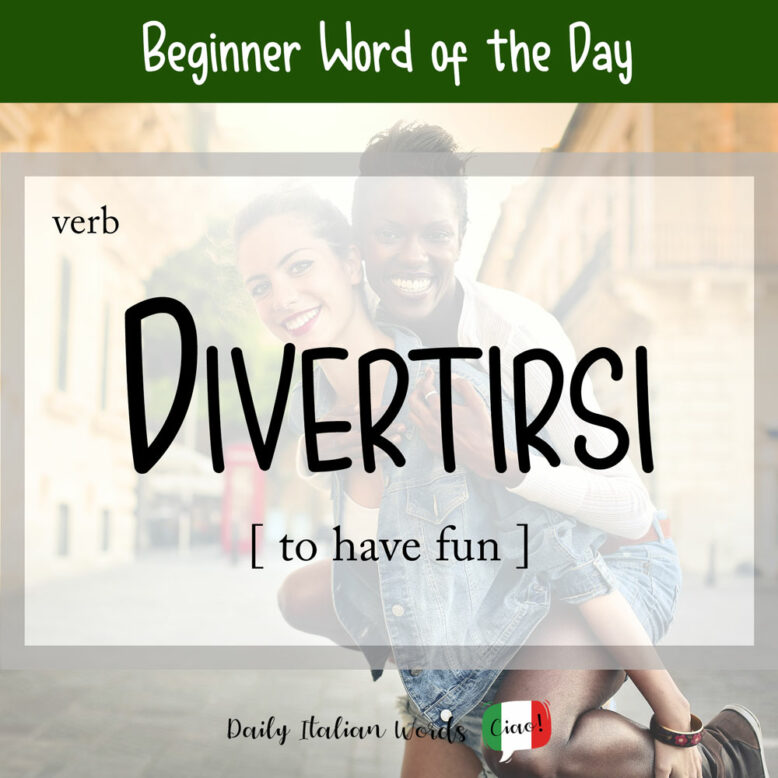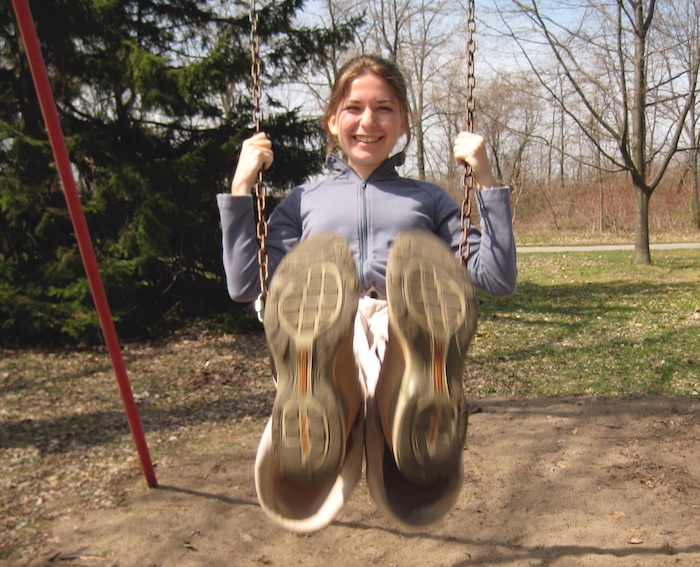In Italian, there is a single reflexive verb that can be used to express the concept “to have fun” and that is divertirsi.

What is a reflexive verb, you ask? Well, it is any verb whose direct object is the same as its subject. In Italian, these verbs always end in si, with some good examples being lavarsi (to wash oneself) svegliarsi (to wake oneself or wake up), and alzarsi (to stand up, lift oneself up).
Another more literal English translation of divertirsi that is also reflexive in nature is “to amuse/enjoy oneself”.
Below are all the infinitive forms for each reflexive pronoun:
- divertirmi = to amuse/enjoy myself
- divertirti = to amuse/enjoy yourself
- divertirsi = to amuse/enjoy oneself
- divertirci = to amuse/enjoy ourselves
- divertirvi = to amuse/enjoy yourselves
- divertirsi = to amuse/enjoy themselves
Andiamo fuori a divertirci!
Let’s go out and have fun!
(Lit: Let’s go out and amuse ourselves!)
Le ragazze vogliono solo divertirsi!
Girls just want to have fun!
(Lit: The girls just want to amuse themselves!)
When conjugated in the present tense, they take on the following constructions:
- (Io) mi diverto. = I have fun. / I amuse myself.
- (Tu) ti diverti. = You have fun. / You amuse yourself.
- (Lui) si diverte. = He has fun. / He amuses himself.
- (Lei) si diverte. = She has fun. / She amuses herself.
- (Noi) ci divertiamo. = We have fun. / We amuse ourselves.
- (Voi) vi divertite. = You (guys) have fun. / You amuse yourselves.
- (Loro) si divertono. = They have fun. / They amuse themselves.
La sera mia mamma si diverte a guardare la televisione.
In the evening my mum enjoys watching the television.
(Lit: In the evening my mum amuses herself by watching the television.)
Mi diverto sempre con te, lo sai?
I always have fun with you, you know?
(Lit: I always amuse myself with you, you know?)

If you want to say someone “had fun” or “has had fun” in Italian, all you have to do is convert divertirsi into what is called the passato prossimo.
Note: Be aware that the ending of reflexive verbs changes depends on the subject: o for masculine singular, a for feminine singular, i for masculine plural and e for feminine plural.
- (Io) mi sono divertito/a. = I had fun. / I have had fun.
- (Tu) ti sei divertito/a. = You had fun. / You have had fun.
- (Lui) si è divertito. = He had fun. / He has had fun.
- (Lei) si è divertita. = She had fun. / She has had fun.
- (Noi) ci siamo divertiti/e. = We had fun. / We have had fun.
- (Voi) vi siete divertiti/e. = You (guys) had fun. / You (guys) have had fun.
- (Loro) si sono divertiti/e. = They had fun. / They have had fun.
As a general rule, the passato prossimo can be used to depict events for which you’d use either a) the simple past or b) the present perfect in English. For example:
- I had fun yesterday. (past tense) = Mi sono divertito/a ieri.
- I’ve had fun watching you sing. (present perfect) = Mi sono divertito/a a vederti cantare.
Of course there are numerous other ways of conjugating divertirsi depending on the tense, but hopefully these examples are enough to get you started!
The Imperative “Have Fun”
If you want to wish someone a good time, you can use the following imperative forms of divertirsi:
- Divertiti! = Have fun! (You, singular)
- Divertitevi! = Have fun! (You, plural)
Non ci saremo stasera. Facciamo una cena romantica a casa. – Divertitevi ragazzi!
We won’t be there tonight. We’re having a romantic dinner at home. – Have fun, guys!
Or if you are having trouble to remember these expressions, you can always resort to Buon divertimento! which means “have fun” “enjoy yourself” or “have a good time”.
Vado a Londra per qualche giorno. – Buon divertimento!
I’m going to London for a few days. – Have fun!

One final expression that doesn’t translate easily into English is Buon proseguimento! It literally translates to good continuation but has the meaning of enjoy the rest of (a trip, day, activity, etc.).
Buon proseguimento delle vacanze!
Enjoy the rest of your holidays!
Did you “have fun” learning these new expressions? Why not try and come up with a sentence of your own using divertirsi in the comments below!
Heather Broster is a graduate with honours in linguistics from the University of Western Ontario. She is an aspiring polyglot, proficient in English and Italian, as well as Japanese, Welsh, and French to varying degrees of fluency. Originally from Toronto, Heather has resided in various countries, notably Italy for a period of six years. Her primary focus lies in the fields of language acquisition, education, and bilingual instruction.


